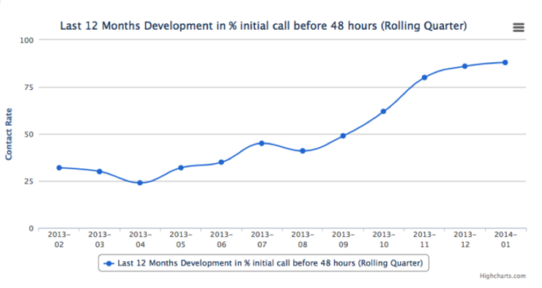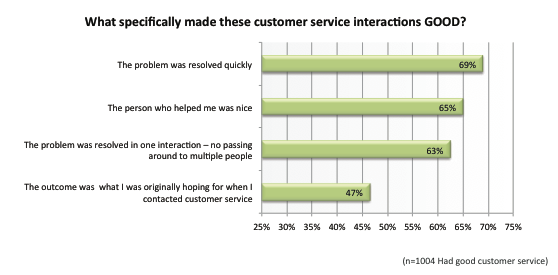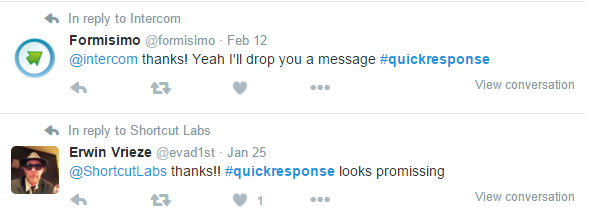If there is one distinction to be made between companies who have loyal customers and those who struggle to retain customers, it would be the speed of customer service.
Just ask LaunchBit’s (recently acquired by BuySellAds) CEO and co-founder Elizabeth Yin.
Speed was the company’s secret to winning over new clients. When the business boomed, the team struggled to maintain their individual inboxes. Yet, they prioritized the same high-level of speed and customer service to stay fresh in their customers’ minds. The strategy worked out well for the company.
If You Snooze, You Lose
Until recently, the enterprise sector has been able to thrive by focusing on the quality of customer service. But expectations are changing rapidly, and the speed of customer service is becoming critical for the velocity (quickness of motion/movement) of enterprise IT.
And while “quality” service with a personal touch is a reasonable starting point, fast customer service has a precisely defined place. This statement is backed by Interactive Intelligence Group’s Customer Experience Survey that identified the most valued attributes for client interaction. “A timely response” ranked higher than efficiency, professionalism, first call resolutions, effective follow-up and knowledgeable agents.
Another survey of customer care leaders and a group of IT professionals found that while service quality is very important, the speed of service still trumps all other aspects of customer service.
In general, B2B companies aren’t meeting this growing expectation.
A lead response study of 2,241 US firms by Harvard Business Review (HBR) found that enterprise leads receive slow responses from sales teams. The results revealed:
- Only 37% of companies responded to their leads within an hour
- The average lead response time of B2B companies was 42 hours
- 23% companies never responded
It’s evident that a majority of enterprises are failing to make fast customer service a priority, and the opportunity is ripe for companies that are willing to engage customers and prospects before competitors call them.
Case in point: A client of CustomerGauge, a global B2B firm, made a decision to improve its Net Promoter® Score by focusing on response time.

Before the formation of this goal, the company responded to 25% of feedback within 48 hours. In one year, the company increased responses to 80% to 85% of feedback within 48 hours. The outcome? An 11-point increase in its Net Promoter® Score.
Now imagine the result if CustomerGauge had responded within an hour.
The HBR survey, mentioned earlier, revealed that, "businesses that try to contact leads within an hour of receiving queries are 7x more likely to enjoy meaningful conversations with key decision makers than businesses that contact prospects even after an hour."
Zendesk’s research survey found that 69% of participants associated their good customer service experience with the quick resolution of their issue.

From these findings, it’s clear that the speed of customer service has a significant impact on a company’s bottom line.
New Customer Service Channels, Faster Communications
Life was simpler for companies when emails and phone calls were the main channels of customer service. But somewhere along the way, social media platforms and messaging apps disrupted the way customers communicate with companies.
Today, customers reach out to enterprise companies via LinkedIn, Facebook, and Twitter. The 2015 B2B Buyer’s Survey Report uncovered that more than 50% of buyers use social media to connect with potential vendors. It brings up an interesting point how social media is now a big deal for the enterprise from a customer service perspective.
But just having a social media footprint is not enough; customers want you to be on the hamster wheel when it comes to customer service.
Check out these findings from a poll of 1000 consumers on how long they’re willing to wait when they reached out to companies through different channels:
- 64% of people using Twitter expect an answer within an hour
- 85% of people using Facebook expect a reply within 6 hours
- 77% of people won’t wait longer than 6 hours for an email reply
Despite these numbers, enterprise businesses have neglected faster social media communications. In fact, 90% of them acknowledged they use social media to respond to customer queries, yet 58% of customers who tweeted about a bad experience never received a reply. And when companies do respond, the average response time to complaints or comments is 9 hours. That’s a mistake because speedy responses win customers and keep churn low.
Here’s how customers react when they receive a quick response on social media:

Messaging apps are also reshaping the customer service. People are using Whatsapp, Snapchat, and Facebook Messenger to engage with customer service reps versus emails and phone calls.
What’s intriguing is that the creators of these applications are integrating features that allow customers to use them as a customer service tool. For instance, WhatsApp announced that it would soon enable users to communicate with organizations and enterprises.
But creators are also facilitating businesses with features that enable quick responses. Facebook allows Page admins to respond to customer queries privately via the “Message” option. When businesses reply to customer messages, a new private message window featuring the comment opens. The reply includes a link to the customer’s query for reference.

Facebook also offers the page responsiveness badge for Pages. It is an indicator of the speed of customer service and is shown on Pages that respond to 90% of the received messages within 5 minutes. All Page admins can see their responsiveness level in page admin control. And to assist businesses, Facebook provides canned (pre-saved) replies that can be used in case of similar queries.

Aspect Customer Experience Index found that chat and text usage for customer service issues will increase exponentially: 367% for text and 250% for chat. Because conversations are private and immediate, customers using these apps expect to receive a quick, personal response.
Learn more: How to create a customer journey map
How Can You up the Ante?
Providing high-quality customer service is essential to improving your customers’ experience. However, “bad” response tickets might pop-up because you’re not responding fast enough. Here are some tips to speed up your customer service:
- Offer Self-Service: Customers want their issues resolved in a timely manner and feel taking action themselves is quicker than contacting company representatives. Providing things like FAQs, forums, and how-to videos is a great way to provide quick answers to customer queries. Research revealed that digital self-service reduces email and call volume. Self-service resources can be used for websites, social media pages, and messaging apps.
- Be Proactive with Inbound Leads: In an enterprise CRM, customer service reps are juggling dozens of tasks throughout the day. It can easily be a couple of hours before they see a lead response notification. By auto-assigning leads for follow-up to the appropriate rep, you can cut down your lead response time.
- Set-up Social Media Alerts: You can use a tool like HelpSocial to specify social media posts that need to be escalated. A keyword alert system enables you to specify phrases and terms that should receive a quick response. The API endpoint can be used to connect the alert feature with other tools to keep on top of social media mentions.
- Utilize In-app Chat Software: No other customer service channel competes with the speed of communication that messaging apps can offer. With in-app chat software, you can respond to queries immediately, as well as send pre-approved push notifications (to tell them your support hours for example).
The enterprise customer service landscape is changing as customer expectations evolve. To make sure your business easily scales, think ahead about every aspect of your customer service including speed.


